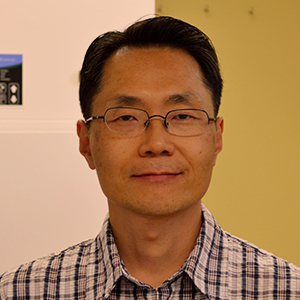
Abraham Koo
Department of Biochemistry and Interdisciplinary Plant Group, University of Missouri, MO, 65211, USA
Abe Koo did his B.S. and M.S. degree at Korea University in Seoul, South Korea. He obtained his Ph.D. in 2004 at Michigan State University (MSU) in Dr. John Ohlrogge laboratory where he studied functional genomics of lipid metabolism in higher plants and wrote a dissertation on the topic of fatty acid trafficking. He joined Dr. Gregg Howe’s group in Department of Energy-Plant Research Laboratory (DOE-PRL) at MSU where he was first introduced to the field of jasmonate. During this time he identified and characterized enzymes involved in JA metabolism including OPCL1 and CYP94B3, and published papers on rapid long-distance wound signaling. In 2012, he moved to University of Missouri as assistant professor in the Department of Biochemistry. The research in the Koo lab centers on metabolism and signaling of jasmonate. Lately, his lab has also been working on impact of altered oil metabolism on host-insect interactions. Dr. Koo was the recipient of the Anton Lang Memorial Research Excellence Award from MSU DOE-Plant Research Laboratory in 2010 and the Arthur C. Neish Young Investigator Award from the Phytochemical Society of North America in 2015. A paper he coauthored in 2009 was selected as Top Five Most-Cited Papers Award by the journal Phytochemistry.
Selected publications
- Howe GA, Major IT, and Koo AJ. (2018) Modularity in Jasmonate Signaling for Multistress Resilience. Annu. Rev. Plant Biol. doi: 10.1146/annurev-arplant-042817-040047. [Epub ahead of print].
- Koo AJ. (2017) Metabolism of the Plant Hormone Jasmonate: A Sentinel for Tissue Damage and Master Regulator of Stress Response. Phytochemistry Reviews.doi:10.1007/s11101-017-9510-8.
- Poudel AN, Zhang T, Kwasniewski M, Nakabayashi R, Saito K, Koo AJ. (2016) Mutations in Jasmonoyl-L-isoleucine-12-hydroxylases Suppress Multiple JA-dependent Wound Responses in Arabidopsis thaliana. BBA. Mol. Cell. Biol. L. 1861:1396-408.
- Zhang T, Poudel AN, Jewell JB, Kitaoka N, Staswick P, Matsuura H, Koo AJ. (2016) Hormone Crosstalk in Wound Stress Response: Wound-inducible Amidohydrolases can Simultaneously Regulate Jasmonate and Auxin Homeostasis in Arabidopsis thaliana. J. Exp. Bot. 67:2107-20.
- Koo AJ, Thireault C, Zemelis S, Poudel AN, Zhang T, Kitaoka N, Brandizzi F, Matsuura H, Howe GA (2014) Endoplasmic Reticulum-associated Inactivation of the Hormone Jasmonoyl-L-isoleucine by Multiple Members of the Cytochrome P450 94 Family in Arabidopsis. J. Biol. Chem. 289:29728-38.
- Bhosale R, Jewell JB, Hollunder J, Koo AJ, Vuylsteke M, Michoel T, Hilson P, Goossens A, Howe GA, Browse J, Maere S (2013) Predicting Gene Function from Uncontrolled Expression Variation among Individual Wild-Type Arabidopsis Plants. Plant Cell 25: 2865-77.
- Koo AJ, Cooke TF, Howe GA (2011) Cytochrome P450 CYP94B3 Mediates Catabolism and Inactivation of the Plant Hormone Jasmonoyl-L-isoleucine. Proc. Natl. Acad. Sci. USA 108:9298-303.
- Koo AJ, Howe GA (2009) The Wound Hormone Jasmonates. Phytochemistry 70:1571-80.
- Koo AJ, Gao X, Jones AD, Howe GA (2009) A Rapid Wound Signal Activates Systemic Synthesis of Bioactive Jasmonates in Arabidopsis. Plant J. 59:974-86.
- Koo AJ, Chung HS, Kobayashi Y, Howe GA (2006) Identification of a Peroxisomal Acyl-activating Enzyme Involved in the Biosynthesis of Jasmonic Acid inArabidopsis. J. Biol. Chem. 281:33511-20.